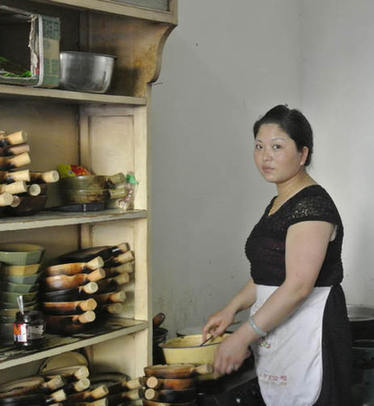Wu Xiaolin: Longing for a Comfortable Life
By staff reporter JIAO FENG
WE arrived in Lushan County of Sichuan Province the day before Dragon Boat Festival.
The small county appeared quiet and peaceful. Some local residents converged in front of a vegetable booth to chat. The stores along both sides of the street were open, inside of which owners leaned back in chairs behind counters, watching TV or reading newspapers. The sidewalks were dotted with bowls of green leaves soaked in water to make Zongzi (Chinese rice dumplings), the traditional food for the impending festival. Some more eager women were already sitting along the street making the dumplings. Grade school students lugging backpacks played noisily, running around with an extra spark in each step. The scene in the county was no different from any other small county in China. If not for various cracked walls, collapsed roofs and tents for temporary shelter along major streets, it would be hard to tell that the county was hit by a 7.0 earthquake just a month ago.
Wu Xiaolin’s small restaurant is on a corner of Dongfeng Street. Above the small storefront are three white Chinese characters against a red background, reading “Shaguo Fan” – marmite cooked rice. The restaurant is so simple that it doesn’t have a signboard. Its 30-square-meter floor space is divided into two parts: a front with six tables and the back kitchen.
 |
| Wu Xiaolin. |
“Our restaurant opened on May 19, 20 days ago,” explained Wu. “The walls have been repainted. Our old restaurant in the old town collapsed during the earthquake on April 20. Afterward, we moved here and rented this place to relaunch the business. This place is owned by my friend, so the rent is relatively cheap.”
Wu is not native to Lushan County. She and her husband hail from Yingjing County about 60 kilometers away. “Our hometown is even more remote and secluded,” Wu said. “My husband and I planned on starting a business after we married. By chance we came to Lushan, where we found that we could rent a small shop for only RMB 3,000 a year. So, we decided to open a restaurant here. We never imagined that our business would continue going strong for 13 years.”
Yang Dejun, Wu’s husband, was born into a family of restaurateurs, so has a strong background in the culinary arts. The couple rented a site in the old town to vend marmite noodles and rice. Due to their reasonable prices and delicious wares, the business has flourished. Wu has two daughters – the elder attends a college for kindergarten teachers in Mianyang City and the younger is still in kindergarten. The income earned from the restaurant is enough to finance the lives of the four-member family. “We don’t have high expectations,” Wu said. “We just want to settle in a place where life is easy and comfortable.” She seems satisfied recalling the restaurant’s early days.
The earthquake upended their peaceful life. “On the day the earthquake happened, we felt the house shaking and heard some people shout ‘earthquake!’ I grabbed my daughter and ran out of the house and then saw the house across the street collapsing,” Wu recalled. “Our furniture and kitchenware, including marmite, plates and bowls, were all destroyed. Luckily nobody was injured. We lived in tents and received governmental assistance for a time. We had daily necessities, like food, water and medicine. The prices remained stable and supplies were substantial.”
In fact, this was not even the first earthquake Wu experienced. During the massive 2008 Sichuan Earthquake, Lushan County was also one of the affected areas. That day, Wu left the hospital after giving birth to her younger daughter. Fortunately, the destruction in Lushan County then was not serious.
With their younger daughter sent back to their hometown, the couple had plenty of time to restart the restaurant in a new town. “People are returning to normal life, going back to work, and life is going on,” said Wu. She is a practical woman with very simple wishes. “Life would be great if there had been no earthquake. Although we worked all day, we could play mahjong with our neighbors in the evening. Now, we can’t keep our daughter with us and have moved a lot, from a tent to a friend’s van, and we still live in the restaurant.”
Wu remains optimistic about the future. She will bring her daughter back to Lushan when school starts in September. She wants to work hard with her husband to earn money to pay for her daughter’s tuition. Also, she wants to save enough to return to her hometown upon retirement. “We are ordinary people, and it's useless for us to think too much. The most important thing for us is to achieve an easy and comfortable life.”

